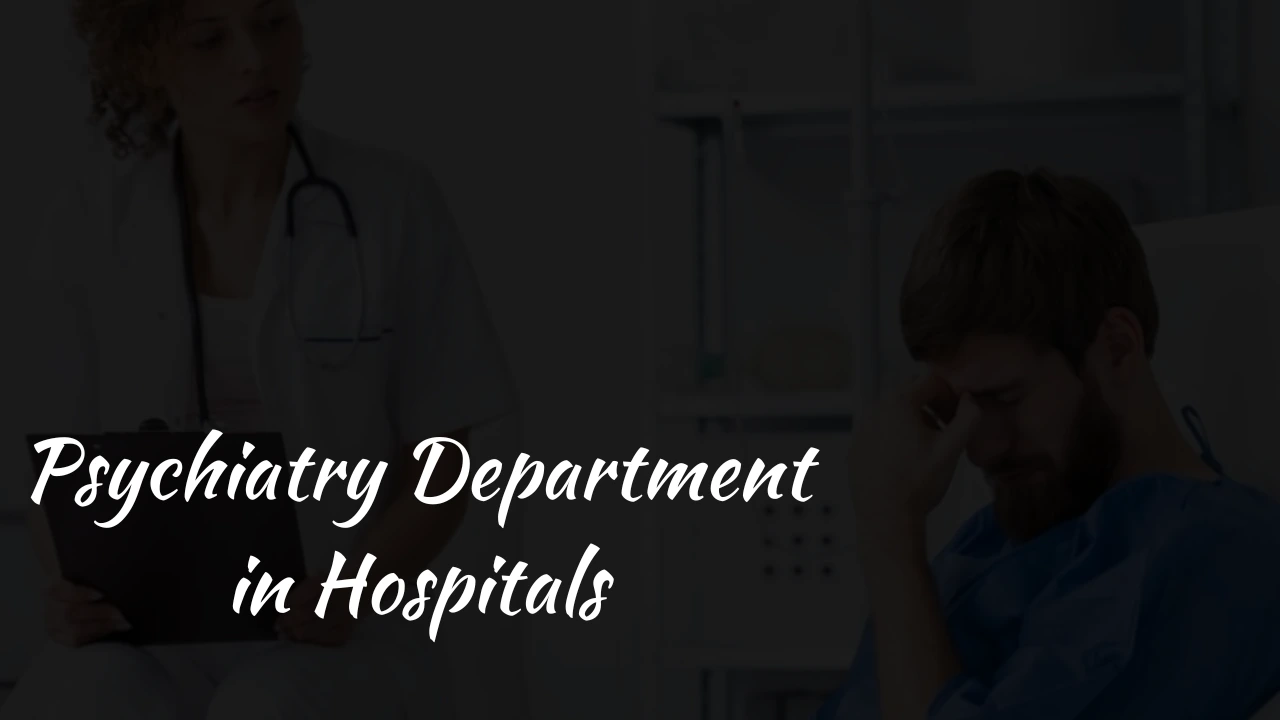When a person feels with some psychological disorder or mental health disorder, then they generally look for the best Psychiatry Department in Hospitals in their area their districts, or states in India. If you have a famous hospital in your area then you can look for the Psychiatry Department in that hospital too. However, there are so many people around us who arenŌĆÖt aware of the Psychiatry Department in Hospitals. If you are one of them and want to know all the details about the Psychiatry Department in Hospitals, then in this blog, you are getting all of it.
In this blog, we have added comprehensive details about the Psychiatry Department in Hospitals such as what is Psychiatry Department, its roles and responsibilities, its features and specifications, what treatment patients suffering from mental disorders or psychological disorders can get the treatment in this department of hospitals, what are key equipments used in Psychiatry Department, and how you can choose the best Psychiatry Department in Hospital in India. If you are excited to know all these details about the Psychiatry Department in Hospitals, then read this blog to the end.
So, letŌĆÖs start:
Complete Guide to the Psychiatry Department in Hospital
The blog below provides comprehensive details about the Psychiatry Department in a Hospital. This blog explains all its components.
What is the Psychiatry Department in the Hospital? ŌĆō What does Psychiatry mean?
The Psychiatry department in hospitals is dedicated to diagnosing, treating, and managing mental health disorders. Psychiatry involves the study of the mind, emotions, and behavior, focusing on conditions like anxiety, depression, schizophrenia, and bipolar disorder. The Department plays a crucial role in providing care to individuals with psychological challenges.
A hospital Psychiatry department typically includes a Psychiatry ward, outpatient services, and counseling rooms. The hospital Psychiatry ward offers inpatient care for severe cases. Psychiatry tests, such as psychological evaluations and personality assessments, are conducted to guide Psychiatry treatment.
The function of the Psychiatry department in the hospital includes therapy, medication, and rehabilitation. Essential equipment in a Psychiatry ward in hospitals includes patient monitoring tools and therapeutic resources. The importance of the Psychiatry department lies in addressing mental health issues effectively, ensuring comprehensive Psychiatry services in hospital settings.
Roles and Responsibilities in the Psychiatry Department in Hospitals
The Psychiatry department in hospitals plays a vital role in addressing mental health. It ensures accurate diagnosis, effective treatments, and comprehensive care. Below are ten key roles and responsibilities.
1. Diagnosis of Mental Health Disorders:
The Psychiatry department conducts evaluations and uses Psychiatry significant tests to diagnose conditions like anxiety, depression, and schizophrenia. Accurate diagnosis is vital for initiating effective Psychiatry treatment and improving patient outcomes.
2. Inpatient and Outpatient Care:
Hospital psychiatry wards provide inpatient care for severe cases, while outpatient services address milder conditions. These settings ensure continuous access to Psychiatry services in hospital environments.
3. Therapeutic Interventions:
Implementing therapies like CBT and psychoanalysis, the hospital Psychiatry ward provides individualized care plans, helping patients manage symptoms and regain functionality through medical Psychiatry approaches.
4. Medication Management:
Prescribing and monitoring psychiatric medications is a critical role. The Department of Psychiatry ensures safe and effective use of drugs for managing mental health disorders.
5. Crisis Intervention:
The Psychiatry department in hospitals addresses acute psychological crises, providing urgent care and stabilization in emergencies, ensuring patient safety and recovery.
6. Mental Health Education:
Educating patients and families about conditions, treatments, and coping strategies is integral. The importance of the Psychiatry department includes fostering awareness and reducing stigma around mental health.
7. Psychiatric Rehabilitation:
The Psychiatry ward supports long-term recovery by offering rehabilitation services that help patients reintegrate into society and maintain independence.
8. Research and Development:
The Department of Psychiatry contributes to advancements in mental health through research on new treatments and improves the quality of Psychiatry services in hospital care.
Read More: What Is Cancer ? Symptoms, Signs, Types & Causes
9. Collaborative Care:
Working with other hospital departments, the Psychiatry department addresses co-occurring conditions, ensuring holistic patient care across various disciplines.
10. Maintaining Essential Equipment:
The hospital Psychiatry room is equipped with tools for diagnosis and treatment. Ensuring the availability of essential equipment in Psychiatry ward settings is crucial for effective care delivery.
Features and Specialities of the Psychiatry Department
The Psychiatry department in hospitals is designed to provide specialized care for mental health issues. Below are the key features and specialties highlighting its unique contributions.
1. Comprehensive Mental Health Services:
The Psychiatry department offers diverse Psychiatry services in the hospital, including diagnosis, therapy, counseling, and medication management, ensuring holistic care for various mental health conditions.
2. Dedicated Psychiatry Wards:
A Psychiatry ward in hospitals provides a safe and supportive environment for inpatient care, allowing close monitoring and tailored Psychiatry treatment.
Know More: What are the symptoms of Diabetes?
3. Outpatient Care Facilities:
Specialized outpatient services cater to individuals with mild or manageable conditions, making the Psychiatry department in the hospital accessible to a broader population.
4. Multidisciplinary Team Approach:
The Department of Psychiatry collaborates with psychologists, social workers, and medical professionals to deliver integrated care for mental health and co-occurring disorders.
5. Advanced Diagnostic Tools:
Psychiatry significant tests, such as personality assessments and neuroimaging, aid in accurate diagnosis and treatment planning.
6. Specialized Therapeutic Programs:
The hospital Psychiatry ward offers therapies like cognitive-behavioral therapy (CBT), group counseling, and psychoeducation for effective recovery.
7. Focus on Rehabilitation:
Rehabilitation services in the Psychiatry ward help patients reintegrate into society, promoting independence and long-term mental well-being.
Also Read: Dermatology Department in Hospitals
8. Crisis Management and Emergency Care:
The importance of the Psychiatry department is evident in its ability to address psychological crises, ensuring immediate and effective intervention.
9. Research and Innovation:
Many Psychiatry departments engage in research to advance knowledge in mental health, exploring new treatments and technologies.
10. Family and Community Support Programs:
The function of the Psychiatry department in the hospital extends to educating families and communities, reducing stigma, and enhancing support for individuals with mental health challenges.
Know More: Nephrology Department in Hospitals
What treatment is provided in the Psychiatry Department?
The Psychiatry department in hospitals provides treatments for various mental health disorders, offering therapies, medications, and rehabilitation. Here are the key conditions treated and their respective approaches.
1. Depression:
A mood disorder causing persistent sadness, fatigue, and lack of interest.
- Cognitive-behavioral therapy (CBT) for negative thought patterns
- Antidepressant medications
- Lifestyle modifications (exercise, sleep routines)
- Stress management techniques
- Support group counseling
2. Anxiety Disorders:
Characterized by excessive worry, fear, and physical symptoms like palpitations.
- Exposure therapy to reduce fears
- Anti-anxiety medications
- Relaxation techniques like mindfulness
- Behavioral therapy sessions
- Psychoeducation for coping strategies
3. Bipolar Disorder:
Involves mood swings from mania to depression.
- Mood stabilizers for chemical balance
- Psychotherapy for managing episodes
- Routine building to regulate sleep and activity
- Family therapy for support
- Education about triggers and early signs
4. Schizophrenia:
A severe mental illness causes delusions, hallucinations, and disorganized thinking.
- Antipsychotic medications
- Psycho-social rehabilitation
- Cognitive enhancement therapy
- Regular follow-ups for medication adherence
- Family counseling to improve understanding
Know More: Top 10 Government & Private Hospitals in Bangalore
5. Obsessive-Compulsive Disorder (OCD):
Characterized by intrusive thoughts and repetitive behaviors.
- Exposure and response prevention (ERP) therapy
- Serotonin reuptake inhibitors (SSRIs)
- Stress management programs
- Psychoeducation to challenge obsessive thoughts
- Behavioral modification plans
6. Post-Traumatic Stress Disorder (PTSD):
A response to traumatic events leads to flashbacks and avoidance behavior.
- Eye Movement Desensitization and Reprocessing (EMDR) therapy
- Trauma-focused cognitive therapy
- Relaxation and grounding exercises
- Peer support groups
- Anti-anxiety medications if necessary
7. Substance Use Disorders:
Addiction to alcohol, drugs, or other substances.
- Detoxification programs
- Counseling and behavioral therapies
- Medication-assisted treatment (MAT)
- Relapse prevention strategies
- Long-term support groups like AA/NA
8. Eating Disorders:
Abnormal eating patterns, including anorexia and bulimia.
- Nutritional counseling
- Cognitive-behavioral therapy for body image issues
- Group therapy sessions
- Antidepressant medications
- Monitoring physical health and vital signs
Read More: Standard Protocols for Paramedics to Follow
9. Panic Disorders:
Sudden episodes of intense fear and physical discomfort.
- Relaxation techniques for calming episodes
- Exposure therapy for triggers
- SSRIs or anti-anxiety medications
- Lifestyle changes to manage stress
- Cognitive restructuring exercises
10. Personality Disorders:
Chronic patterns of behavior affecting interpersonal relationships.
- Dialectical Behavior Therapy (DBT)
- Medication for associated symptoms like depression
- Social skill-building activities
- Anger and emotion regulation techniques
- Psychoeducation to improve self-awareness
Essential Equipment used in the Psychiatry Department
The Psychiatry department in hospitals utilizes specialized tools and technologies to assess, diagnose, and treat mental health conditions effectively. Below is a list of key equipment and their applications.
1. Electroencephalogram (EEG) Machine
In the Psychiatry department in hospitals, this device monitors electrical activity in the brain to detect abnormalities, aiding in diagnosing conditions like epilepsy or sleep disorders that affect mental health.
- Detects seizure activity in psychiatric patients
- Assesses sleep patterns in disorders
- Evaluates brain function during treatment
2. Biofeedback Devices
In the Psychiatry department in hospitals, this device measures physiological functions like heart rate and muscle tension to help patients manage stress and anxiety.
- Teaches relaxation techniques
- Tracks physical responses to emotional states
- Supports therapy for anxiety and PTSD
Also Read: Importance of Health, Benefits, Types, Maintain & Factors
3. Psychometric Testing Kits
In the Psychiatry department in hospitals, this device includes standardized tools like questionnaires to evaluate mental health conditions such as depression, OCD, and personality disorders.
- Diagnoses psychological conditions
- Monitors treatment progress
- Assesses cognitive and emotional functioning
4. Transcranial Magnetic Stimulation (TMS) Machine
In the Psychiatry department in hospitals, this device is from Non-invasive tool that uses magnetic fields to stimulate brain activity, especially for depression treatment.
- Treats treatment-resistant depression
- Reduces symptoms of OCD
- Aids in research on brain function
5. Virtual Reality (VR) Systems
In the Psychiatry department in hospitals, this device is an example of immersive technology used in exposure therapy to treat phobias, PTSD, and anxiety disorders.
- Simulates safe environments for exposure therapy
- Assists in trauma recovery
- Supports therapy for social anxiety
6. Therapeutic Light Boxes
In the Psychiatry department in hospitals, this device is a bright light therapy device used to treat seasonal affective disorder (SAD) and other mood disorders.
- Provides relief from SAD symptoms
- Improves sleep-wake cycles
- Enhances mood in depressive conditions
Know More: Full Details About Sitting Positions | Sitting Positions Types, Benefits, & Sitting Positions Names
7. Medication Dispensers
In the Psychiatry department in hospitals, this device is an automated tool for organizing and dispensing psychiatric medications accurately.
- Ensures correct dosages for patients
- Supports medication adherence
- Prevents drug misuse or errors
8. Cognitive Training Software
In the Psychiatry department in hospitals, this device is a set of digital tools that help improve memory, attention, and cognitive flexibility in patients.
- Enhances cognitive skills in schizophrenia
- Assists in ADHD therapy
- Monitors cognitive recovery progress
9. Patient Monitoring Systems
In the Psychiatry department in hospitals, this device is used in the Psychiatry ward in hospitals to track vitals like heart rate and respiratory rate during critical treatments.
- Ensures safety during crisis interventions
- Monitors physical health alongside mental health treatments
- Supports emergency care in psychiatric crises
10. Art and Activity Therapy Kits
In the Psychiatry department in hospitals, this device supplies creative therapies, including drawing, painting, or music therapy.
- Encourages emotional expression in patients
- Reduces stress and improves mood
- Supports therapy for trauma and depression
Also Read: What are the rules and Regulations of ambulance in India?
How to Choose the Best Psychiatry Hospital in India

Selecting the right hospital for mental health care requires evaluating facilities, expertise, and treatments. Here are essential factors to consider when choosing a hospital with an excellent Psychiatry department in hospital settings.
1. Reputation and Expertise
Ensure the hospital is renowned for its Psychiatry department, with experienced psychiatrists and multidisciplinary teams. A well-established department of Psychiatry offers comprehensive Psychiatry services in hospital environments, ensuring quality care.
2. Range of Treatments Offered
Check if the hospital provides diverse Psychiatry treatment options, such as therapies, medications, and rehabilitation programs. Understanding Psychiatry’s meaning and treatments for conditions like depression and schizophrenia ensures better outcomes.
3. Diagnostic Capabilities
The hospital must conduct Psychiatry significant tests like personality assessments and imaging. Knowing what is Psychiatry tests used for accurate diagnoses reflects the hospitalŌĆÖs commitment to precision.
4. Inpatient and Outpatient Facilities
A quality hospital should have both outpatient services and a dedicated Psychiatry ward in hospitals for severe cases. An efficient hospital Psychiatry ward ensures personalized care and safety.
Know More: Top 10 government cancer hospitals in Delhi
5. Advanced Technology and Equipment
Choose hospitals equipped with modern tools like EEG machines and TMS devices. Access to essential equipment in Psychiatry ward settings highlights advanced care capabilities.
6. Multidisciplinary Approach
Hospitals offering integrated care through multiple Psychiatry departments and collaboration with other specialties ensure holistic treatment, addressing physical and mental health comprehensively.
7. Emergency and Crisis Support
Evaluate the function of the Psychiatry department in the hospital to manage emergencies, such as acute psychosis or suicidal tendencies. The hospital should have a responsive crisis intervention team.
8. Environment and Infrastructure
A supportive and safe environment in the hospital Psychiatry room or ward is critical. Ensure the hospital fosters comfort, privacy, and patient engagement.
Also Read: The Obstetrics and Gynecology Department in Hospital
9. Affordability and Accessibility
Choose a hospital offering affordable Psychiatry services in hospital settings, with transparent treatment costs. Accessibility to the hospital is equally vital for regular follow-ups.
10. Patient Reviews and Testimonials
Assess feedback from former patients about the importance of the Psychiatry department and its success in delivering compassionate care. Positive reviews reflect the hospital’s reliability and effectiveness.
Book Ambulance: GoAid Ambulance Service
Conclusion to the Psychiatry Department Hospitals
in conclusion, The Psychiatry department in hospitals plays a vital role in addressing the growing need for mental health care. From offering accurate diagnoses through significant tests in psychiatry to providing holistic psychiatry treatment options, these departments ensure comprehensive support for patients. Equipped with advanced tools and staffed by multidisciplinary teams, they cater to various mental health conditions in both inpatient and outpatient settings. The importance of the Psychiatry department lies not only in managing mental disorders but also in promoting awareness and reducing societal stigma.
We have provided detailed information about the Psychiatry department, including its roles, responsibilities, features, treatments, and essential equipment. This guide will help you understand the function of the Psychiatry department in hospital settings and make informed choices. If you have any additional questions or require further clarification, feel free to ask in the comment box below! Your mental health matters, and seeking the right care is a step toward recovery.
FAQ
Question-1: What is the Psychiatry department in a hospital?
Answer: The Psychiatry department in a hospital focuses on diagnosing, treating, and managing mental health disorders, emotional issues, and behavioral problems.
Question-2: What is the Psychiatry definition in medical terms?
Answer: Psychiatry is a branch of medicine that deals with the study, diagnosis, treatment, and prevention of mental, emotional, and behavioral disorders.
Question-3: What happens in the Psychiatry department?
Answer: In the Psychiatry department, patients undergo assessments, significant tests, therapy sessions, counseling, and personalized treatments to address their mental health concerns.
Question-4: What is the function of the Psychiatry Department in a hospital?
Answer: The department of Psychiatry aims to provide comprehensive care, including diagnosing mental health issues, administering therapies, prescribing medications, and offering support for rehabilitation.
Question-5: What are some of the Psychiatry significant tests?
Answer: Common Psychiatry significant tests include psychological evaluations, neuroimaging scans, personality assessments, and diagnostic interviews to understand the patient’s condition.
Question-6: What treatments are offered in the Psychiatry department?
Answer: Psychiatry treatment includes medication management, psychotherapy, behavioral therapy, cognitive therapy, and family counseling to manage and improve mental health.
Question-7: What is the importance of the Psychiatry department in hospitals?
Answer: The importance of the Psychiatry department lies in addressing mental health issues, improving patients’ quality of life, and promoting emotional well-being in the community.
Question-8: What does a hospital Psychiatry ward do?
Answer: A Psychiatry ward in hospitals provides inpatient care for patients with severe mental health issues, ensuring their safety and offering intensive therapy and monitoring.
Question-9: What essential equipment is found in a Psychiatry ward?
Answer: Essential equipment in a Psychiatry ward includes comfortable furniture, calming decor, therapeutic tools, medical supplies, and safety measures to prevent self-harm or injury.
Question-10: What are Psychiatry Services in a Hospital?
Answer: Psychiatry Services in a Hospital encompass outpatient consultations, inpatient care, emergency interventions, therapy sessions, and support groups for patients with mental health conditions.
















